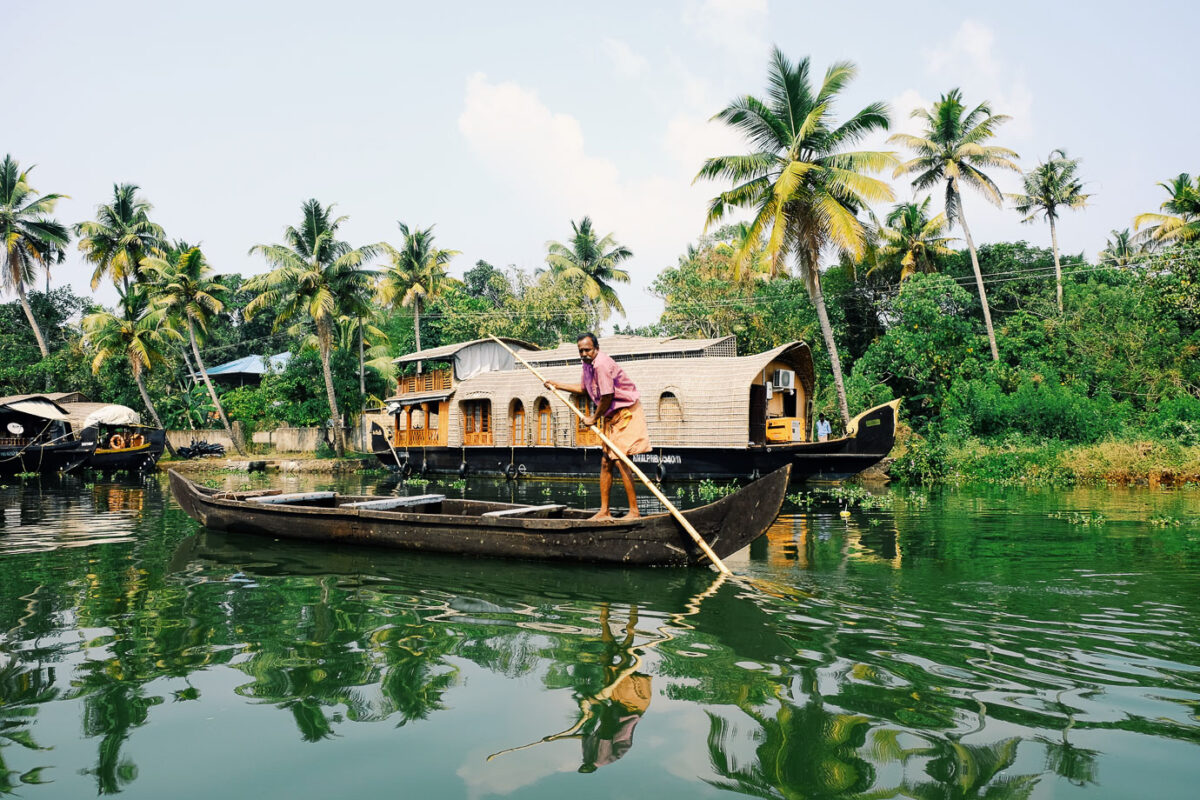In the 1990s, I made a 3 month road trip around the south of India, starting and finishing in Goa. My route was Bangalore, Mysore, Cochin, Kovalem Beach in Kerala, Travandrum, Madurai, Pondicherry, Mamallaparam, Madras (now Chennai), Hampi and back to Goa.
I spent around a month in Goa and was quite terrified of leaving. All the people I met there, who had come from other parts of India, told me horror stories of being ripped off, falling victims to scams, getting horribly sick and enduring white-knuckle bus rides and disgusting food.
They had all come from the typical northern circuit – Rajasthan, Jaipur, Agra, Varanasi, etc. I decided to be contrary and travel in the complete opposite direction. The south of India proved to be a completely different proposition.
First, let me explain that India is an incredibly diverse country with many cultures, languages and peoples. When I flew from Goa to Delhi, for example, it was like arriving in a completely different country. The weather was colder and so were the people. The food is completely different – the south being more known for vegetarian.
The main difference was the lack of an established tourist industry in the south. There were no hostels or tourist restaurants. This explained the complaints about the food in the north. When you stay in a hostel or tourist guesthouse, they serve you western food, which is disgusting. The cheese is not real cheese. The bread is stale and horrible. They just can’t do it. In the south, I ate like a king. The (Indian) restaurants were superb and everything was super cheap.
You have a massive advantage there as a foreigner. For a start, you stick out and attract attention (if that’s your thing). At the time, I had a small goatee beard and constantly received random compliments on the street from other men, who admired my facial hair. Most Indian men have moustaches. But regardless of facial hair, from my experience the people in the south were way friendlier.
In India, people are divided according to a caste system (more on the caste system later). As a white foreigner, you are automatically a member of the upper caste. That entitles you to enter any fancy restaurant or 5 star hotel, even if you are dressed in rags and covered in dust. We ate every night in some amazing restaurant or in old palaces converted into hotels.
Still, travelling was a real challenge and to survive I generally followed a rule of 1 week travelling broken up with 2 weeks beach time.
Crazy cricket match in Bangalore
Eventually I summoned up the courage to leave Goa. My incentive was to attend a cricket match between New Zealand and India in Bangalore. Before arriving in India, I had been living in Japan and had lost touch with New Zealand sport. In Goa one day, I found a random newspaper written in English and found out that the New Zealand cricket team were touring. There was a 5 day test match about to start in Bangalore the next day. I went to the local town to buy a flight, but could only get there on the second day, as the play was concluding.
I arrived at the stadium the next morning only for New Zealand to lose the match by an innings! For those unfamiliar with the rules of cricket, this was a thrashing! Still, I got to experience a unique cultural event unlike any cricket match I had attended at home. I was the only white guy in the whole stadium. The crowd were going wild and every so often a bomb would go off in the stadium and the crowd would separate and a plume of smoke would rise up into the air. I found out later, these were actually home made firecrackers, but powerful enough to burst an eardrum if you got too close to one.
We always used to lose when we toured India – the heat, biased umpires (these days international matches have neutral umpires), the food… but with these fireworks going off every 5 minutes, I could imagine it would be difficult to concentrate!
The sledging (taunting the opposition players with insults) was also vicious. In the New Zealand team at the time, there was a player called Dion Nash. He faced a continuous barrage of insults, “Hey Nash, you got cash?” or my person favourite: “Nashed Potatoes!”. Who said the Indians have no sense of humour?
Mysore festival of lights
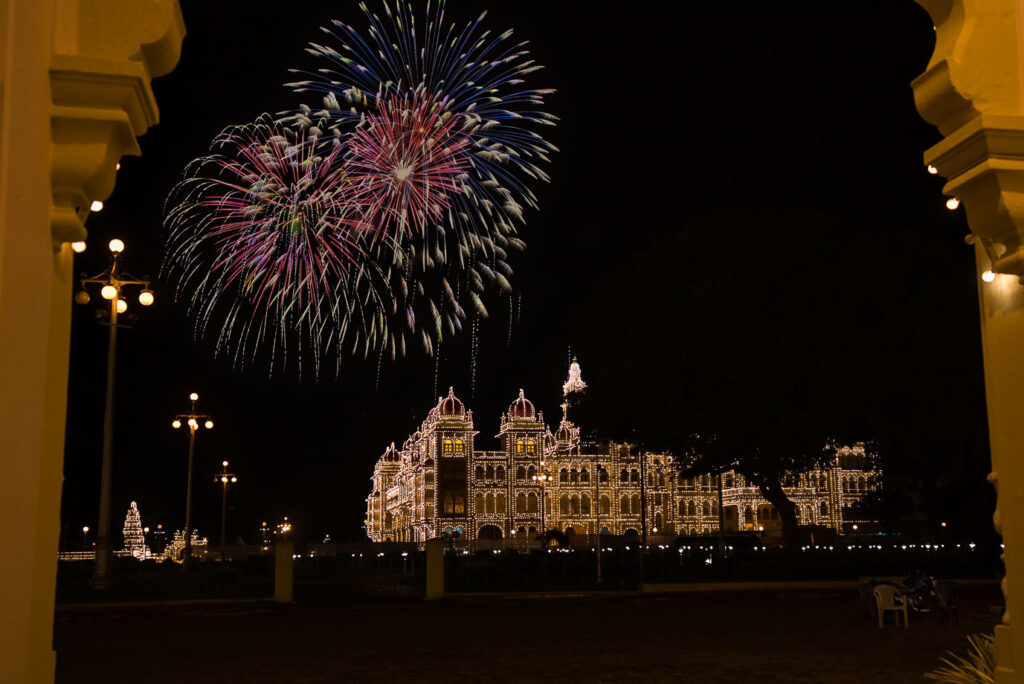
As the cricket ended in disappointment, it was time to move on further south to Mysore in the province of Karnataka. Mysore is a pleasant and very clean city (by Indian standards) famous for its palaces, including Mysore palace which is lit up with thousands of light bulbs on Sundays and public holidays. I happened to pass through during the Dasara festival which happens in September and October over a 10 day period. I remember the city being lit up with thousands of candles and of course people throwing the same home-made fireworks at each other.
Getting on the wrong train at Cochin
From Mysore, I travelled by train to Cochin (now Kochi), a large port city. Note that travelling by train was by far the best method of transport at the time in India. The roads were extremely treacherous. There is only one road rule – might is right. Trucks take precedence over buses, which rule over cars, then come motorbikes, bicycles and carts, and at the bottom of the heirachy, pedestrians. It was not uncommon for people to be walking along major roads out in the countryside. Herding goats, driving a horse and cart or simply walking to where they wanted to go. This meant that is was common for buses to drive down the center of the road to avoid people walking along the edges. But what happened in 2 buses came hurtling towards each other in the center of the road, coming in opposite directions? It then became a game of chicken, with the first driver to blink suddenly lurching to the left to avoid an imminent head-on collision.
The train system in India is one of the largest in the world and amazingly seems to function, although the trains are never on time. From Cochin, I hooked up with another couple who wanted to travel south to Kerala, to do the famous “boatwaters” trip. We decided to spend a bit more (still a pittance) to upgrade to first class. Cochin is a bustling city with a large train station with multiple platforms. There was no electronic board telling you which train was arriving on which platform.
We finally found the correct platform and by some miracle, the train turned up on time. We were extremely suspicious and asked about 6 different station employees including even the train driver if we were on the right train. Of course they all said yes, because in India it is better to lie than to admit you don’t know the answer. Admitting you don’t know something is losing face, which is much worse than lying and actually deliberately misleading someone.
So, we got on the train but were immediately suspicious. The are different varities of first class – with or without air con, etc. Something was not quite right, but as most people ride second or third class, there was no-one else in the whole carriage to ask for help. Finally after about an hour, a conductor came by and checked our tickets. We were indeed on the wrong train! Our train was delayed by 2 hours and the train we were on was also delayed by 2 hours! This train was going in the wrong direction, but luckily we managed to get off at a junction station and waited there for 2 hours until our actual train arrived.
Backwaters trip in Kerala
The famous Backwaters are a series of canals and waterways along the south west coast of India. You can take a cruise for the whole day and just chill whilst observing people go about their daily life. It was one of the highlights of the trip.
The entry point is a town called Alleppey. I stayed there one night. My hotel offered to sell me a ticket for the boat. I had managed to pick up a pretty nasty cold and was really struggling to walk to the canal to catch the boat. Well, it turned out there was many boats and everyone was trying to sell me a ticket. To get rid of them, I told them I already had a ticket. They didn’t seem to believe me, so to convince them, I produced the ticket and waved it in their faces to shoo them away. They all claimed I had bought the wrong ticket and offered to sell me the correct one. Of course, I was not going to fall for that trick and ignored them. Finally, I found the boat and guess what? The hotel had indeed sold me the wrong ticket. I had to walk all the way back to the hotel carrying my heavy backpack. When I got there, they simply swapped my ticket for the correct one. No apology at all. Just the way it is in India.
Still, the trip itself was well worth it and a welcome escape from the hustle and bustle of the cities, trains and roads.
Hanging out on Kovalem beach
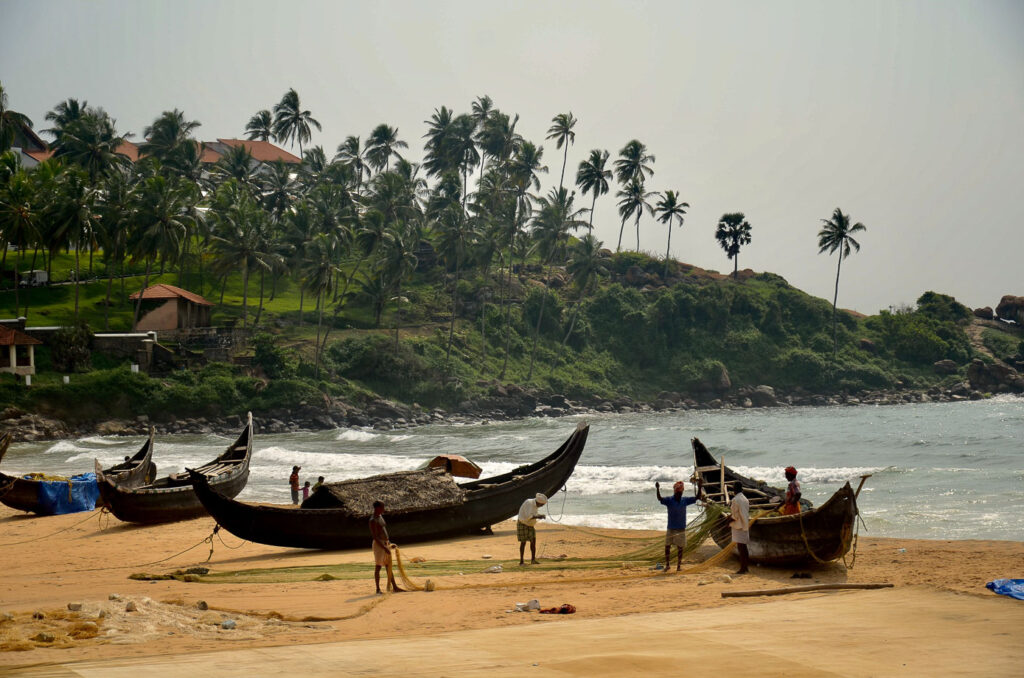
Next it was time for some R&R on a beach. On the Backwaters trip, I met an English couple, Mick and Karen, who would later turn out to be my best friends when I moved to England some years later. We hung out on this chilled beach near Travandrum, the southern most city in India.
We befriended some young guys who supplied us with hashish and played frisbee with us all day on the beach. Through them, we gained some real insights into Indian culture. I felt sorry for these guys as they had to hang out and dance with each other at night, because all the women were home after dark under lock and key. Note, it is quite common in Asia, especially in India, for groups of guys to walk along the beach hand in hand, or, in this case, dance with each other. It in no way confers sexual orientation.
One of the guys was the only son and the youngest sibling in a family of 9. Having a son is, of course, very important and the poor mother had to keep conceiving until they finally had one! The parents lived in a tiny shack in abject poverty. They used to be wealthy owning several guest houses and restaurants. But due to the dowry system in India, they had given away all their property and wealth to successive sons in law. One son who was now the owner of their guest house, was a drunk layabout who did no work all day and just verbally abused people.
These young guys got all their sex education from their older brothers, who had married and found things out for the first time on their wedding night. Men and women live completely separate lives until married and cannot socialise with each other. Sex is a taboo subject and forbidden before marriage.
One evening, we were in a bar/restaurant and a European woman arrived alone. The Indians guys were laughing at her. When we enquired as to the reason, they said it was the colour of her dress. To us, she was dressed quite modestly in a long, loose dress covering her legs and shoulders. However, the colour was pink – the colour of underwear for local Indian women. So, it was the equivalent of a woman walking into a restaurant in Europe wearing only underwear.
One thing that really annoyed us was how local kids were treated on their own beach. The beach was public, yet some hotels decided to employ security guards who would patrol the beach with large batons and beat any small kids who happended to be playing on the water. Just so the tourists and rich Indians could enjoy the beach free of poor people. This is one of the unfortunate realities of the caste system in India – the upper caste treat the lower castes like shit and they just put up with it, because that’s the way it is.
An amusing story the local guys told us was how the drug trade worked. Basically, the whole trade is controlled by the local authorities, including distribution, logistics, etc. On one occasion, a solider tried to smuggle a whole bunch of weed and/or hash through a police checkpoint. The police found the stash in his vehicle, confiscated it for themselves and sent him packing with a beating. He went back to his army barracks and rustled up a posse of his mates who then attacked the police at the checkpoint. It ended up in a mass brawl, with locals looking on with great amusement, as the police and army were both disliked with equal intensity!
Surprise guest of honour at Indian wedding
After 2 weeks chilling on the beach, it was time to move on. I travelled northwards to the city of Madurai in the state of Tamil Nadu. It is a city of about 1 million people, so quite small by Indian standards. It has some nice temples and is worth a visit. Unfortunately, I had my camera stolen, hence none of the photos in this post belonging to me.
The highlight was randomly attending a local wedding. The guest house where I was staying was part of a large complex of buildings on spacious grounds. I hooked up with another dude staying there and we went out to the poshest hotel in town for dinner. This is where I lost my camera, which was stolen out of my small backpack.
When we returned, we heard some loud noises and commotion coming from one of the buildings and wandered over to see what was going on. It turned out to be a huge Indian wedding with hundreds of guests. Things just seemed to be getting going. We didn’t want to disturb proceedings, so kept to the peripheries out of sight. It was only a matter or time before some people noticed us. I was expecting to be asked politely to move on, but instead we were suddenly the guests of honour! We were whisked into a small room at the back, where the bride was being prepared with elaborate decorations and makeup. Clearly this was a private area reserved only for the bride’s close family and intimate friends. When eventually proceedings got underway, we were given a front row seat – the best view in the house. These type of random authentic moments are what make travelling independently special.
Madras and the east coast – Pondicherry and Mahabaliparam
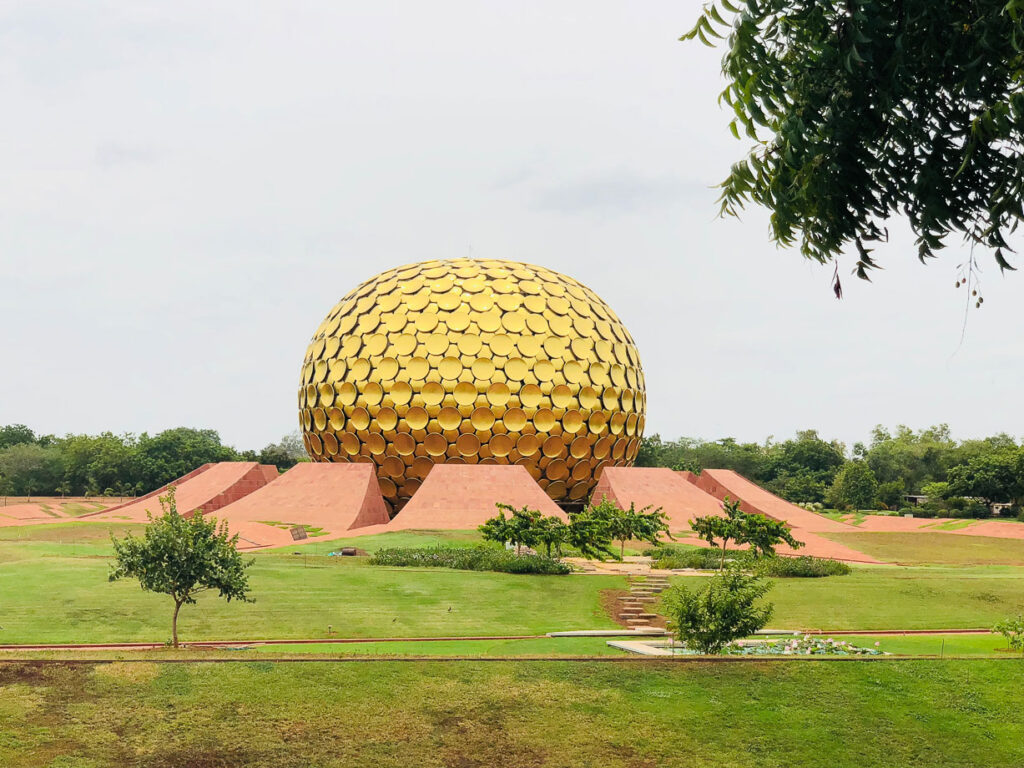
From Madurai, I travelled up the east coast to Madras (now Chennai) via Pondicherry and Mahabaliparam.
Pondicherry is a pleasant seaside town with a French colonial history. There is a nice seaside promenade and even the police wear berets. Unfortunately, the promenade is only for tourists and high caste rich locals. Anyone else daring to step foot on the promenade was met with a swift beating from the large canes the police carried around.
In Pondicherry, I was really confronted with the extreme poverty in India. Just a few blocks back from the beautiful clean promenade were people living in squalor. I saw low caste people, the dalits (also known as the Untouchables), living like animals. They live in the countryside and come into town to perform work that no Indian will do, like cleaning sewage or carting off dead bodies. It was shocking and disgusting seeing how these people were treated.
Near Pondicherry, you can visit this bizarre commune called Auroville. It is some kind of alternative community of spiritually inclined Indians mixed with some hippie-ish French and other European residents. You can pay a visit to some carefully curated visitor’s centre with pictures of Europeans and Indians living in harmony with each other, the kids playing and everyone generally living a Utopian life. I found the whole place to be quite creepy and elitist, in contrary to the image of being open and inclusive. The first thing I found really strange was the beautiful lawn and green grass surrounding the Matrimandir, a huge dome constructed using huge golden disks. It is all a bit wierd and extravagant and obviously a huge waste of water needed to constantly keep the grass alive in the extreme Indian heat. There have also been accusations of child abuse and other crime, which has been vehemently denied by the commune’s leaders.
Back in Pondicherry, I was constantly hounded by rickshaw drivers, who seemed to be the poorest and most desperate I had yet encountered on my trip. When I arrived, I negotiated a price for a ride to a guest house in my guide book. When we arrived, the place was full and I had to find somewhere else. The driver took me round a couple of places until I found one with space. I paid him extra to account for the additional travelling we had done. But because we had not negotiated that extra tariff in advance, he took the opportunity to demand more. I politely refused and left him shouting at me on the street. Well, that was the end of that, or so I thought. The next morning, I left the guesthouse and started walking out and about, only to find none other than the same rickshaw driver who proceeded to berate me and demand compensation! It seemed he had stayed on the street the whole night waiting for me to come out!
I realised the rickshaw drivers were so desperate, you had to ignore them altogether, rather than politely declining their services. Even a slight look in their direction was enough encouragement for them to follow you and solicit business. One time, a guy followed me round for hours. It was getting really tiring, so I went to the seaside and sat in a nice restaurant with sea view, reading my book. When I eventually came out 4 hours later, he was still there waiting for me!
This happened again when I was walking to the bus station to leave town. A rickshaw driver offered me weed, which caught my attention for a split second before I thought better of it and proceeded to walk away. Seeing an opportunity, he followed me for ages but eventually gave up when I ignored him. Luck that I had because about 10 minutes into the bus ride, we were stopped at an army checkpoint. It was a local bus and there were only 2 tourists in addition to me on the bus. They singled us out and we had to get off while they searched our backpacks. Luckily, they found nothing. A very close call. I found out later, they were actually searching for another drug, alcohol. Tamil Nadu was a dry state at that time and alcohol was only available in certain hotels in certain tourist areas, one of them being Pondicherry. These army dudes were expecting that foreigners were all drug addicts (alcoholics) who could not do without their hit and whom could be bribed.
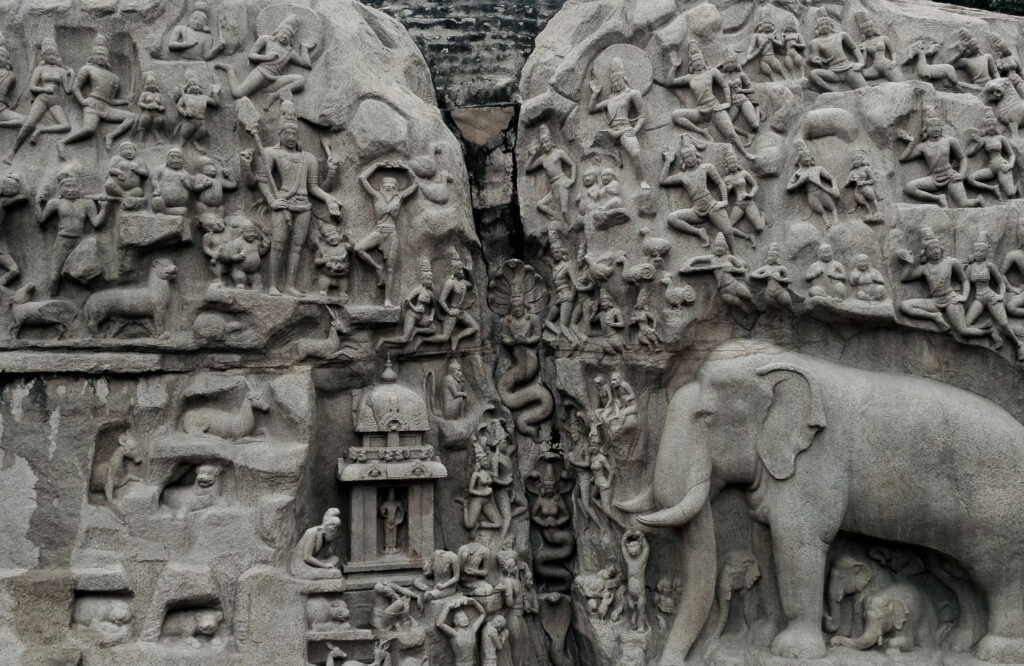
On the way north to Madras, I stopped off for a night at a small historic village Mahabaliparam. It is famous for a temple complex and rock carvings dating back to the 7th and 8th centuries.
While travelling in India, it is best to try to avoid the bigger cities. I described them as “organised chaos” – hectic, noisy, dusty – but at the same time with everyone having a purpose in the system. Madras was the worst city I visited in India (perhaps with the exception of Agra). Just a horrible crowded place. There is long main street with several names, the English one being Mount Rd, named after some English colonial overlord. One day, Mount Rd was closed to allow some politician to pass through with a cavilcade. When the road was re-opened, there were no rickshaws available. I was forced to take a crowded bus where I was pickpocketed and lost my credit card, my only source of funds, which I had stupidly put in my wallet in my pocket instead of a pouch under my clothes! I had to call my parents in New Zealand to wire me some money until a replacement card eventually turned up when I got back to Goa.
The rickshaw drivers were the biggest bunch of liars I met on my whole trip. I would negotiate the price to a destination and double check the driver knew where to go. We would drive around at night for about 45 minutes before the driver would stop and turn to me to ask: “Where you go?” Of course, there was no internet at this time. Certainly no google maps or Uber. One night this happened again and told the driver to take me to Mount Road (the main and most famous street in Madras). He just could not work out what I was trying to say. So, I tried all kinds of variations on the pronunciation and tone, even trying the odd headshake here and there to no avail. He gave up trying to understand me and instead drove to a jewellery shop where presumably the owner could speak English. We went inside and he said something to the owner in Tamil. The owner turned to me and asked me where I wanted to go. I said Mount Rd. He then turned to the rickshaw driver. I expected him to translate to Tamil, as perhaps he was not familiar with the English name of the road. In India, there are many many languages and it is common to give landmarks multiple names. Instead he said to the driver: “Mount Road”, to which the driver responded, “Mount Road!”, as if this was some kind of revelation! F**k!!
Hampi
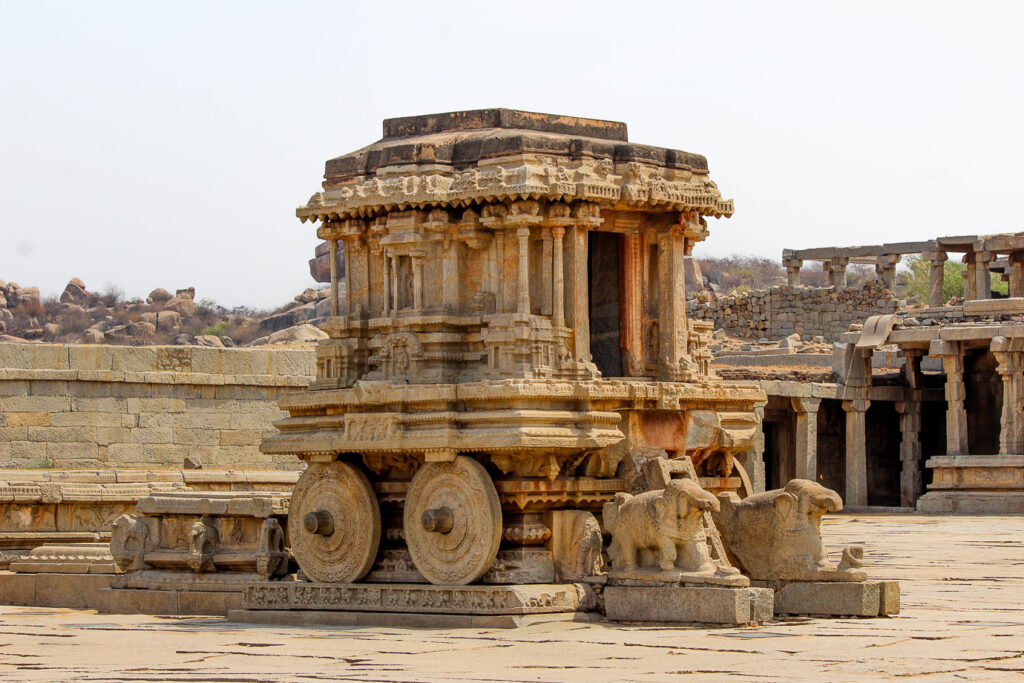
To get back to Goa for the party season, I had to traverse the country westward. This proved to be a bit of a nightmare journey, as there was no direct route, the roads were poor and not public transport lacking. In fact on the way, I had to change at a junction station and there was a bus strike. I met these 2 English hippies and we had to negotiate a driver to take us in his landrover. The journey was brutal. Finally we made it to the historic village, Hampi.
Hampi was probably the nicest place I visited in the whole of India. A special place of historical and spiritual significance. It has a special vibe and is full of wonderful ancient monuments and temples. It is not that far from Goa and a lot of hippies make the trip there with occasional hippie parties. Certainly there was a lot of hash about and some were also tripping on acid in the temples.
From there, I made my way back to Goa in time for the party season. Unfortunately, but perhaps inevitably, I got horribly sick on the final bus ride after eating some dodgy cold samosa at a truck stop.
This trip really opened my eyes to the reality of life in India – incredible variety and diversity of cultures and languages – but also severe hardship and poverty. Travelling was hard, but incredibly rewarding. I made some lasting friendships and those memories will live with me forever.
